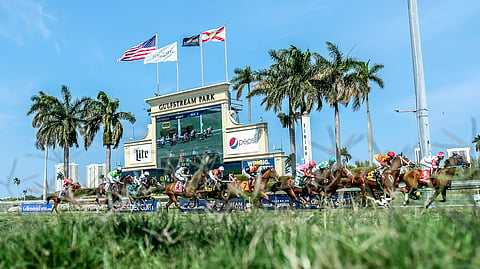

Follow Me @RtsSpot and facebook.com/rtsspotplays
For Sunday, Dec. 29, we are going to look at Gulfstream Park, Race 9. This is a $16K Allowance Optional Claimer with a $40K purse. Entered are Florida breds three years old and up going one mile on the turf. Yesterday, the turf course was yielding and today, the weather is expected to be a gorgeous 78 degrees at first post.
After running the Equibase numbers thru SmartCap, you can see below that this is a highly competitive race and you can make a case for several. So, I’ll try to take a stab at how I think the race will be run: #11 – Souper Jaguar (5/2) will be the horse to catch starting in the backstretch. You’ll see #12 (if main track) Just Kidding (2/1), #3 – Lucky Mike (12/1), #7 Tipsy Kitten – (8/1), #1 – Dark Ages (5/1), and #5 Zap Daddy (7/2) in tow. As they enter the turn, look for the field to narrow down to the 1, 11, 5, 8 and 3. As they enter the stretch, watch for #5 Zap Daddy with Irad Ortiz to take the and run down the 11 because the 11 has to run wide to begin and will tire.
Editor's note: #5 Zap Daddy scratched.
WANNA BET HORSES?
If you're a horse player in any of 30 states, you can sign up with NYRA BETS. Promo code: INSIDER. Free first deposit match up to $200.
SmartCap is an algorithm-based system that helps the horse player identify key contenders in a race.
Developed by a math prodigy from West Point, you will receive a graph like the one below, per race, when you order SmartCap.
The figures along the left represent each entrants’ best last race, with the top number being the speed and the bottom number is its class. In this example, #10 comes out clearly ahead in class and speed which gives him an edge. Why is that number important? It identifies the horse that is in shape and like human sports competitions, the person(s) in the best shape has the advantage.
The graph on the right represents a horses’ overall rating. When you look at this graph, you will notice on the top far left, the track and race number. This is from Penn National, race two. To the right of this is this races’ class rating and its money – money being the separator for class. So, in this example, we have a $5K race and the class rating is 73. The 73 is the rating set by Equibase. At Penn 2 for this, you have a horse who raced a 62.9 overall versus a 106.2 overall. Now, #7 has a slightly better speed rating yet has been racing against lesser competition. The #10 has the best last, close speed rating, and by far best class, it would be a play. It won going away.
If you are unfamiliar with Equibase, they are the most reliable source for PP’s in the industry. Additionally, one reason why you may see us posting picks to the same tracks is Equibase installed their own GPS technology at Mahoning Valley, Penn National and is the official timer at Golden Gate, Laurel, Woodbine and Pimlico.
You must consult your PP’s regardless of what this graph tells you – especially in routes because this is where jockey skill makes the paramount difference. You can have the best horse in a certain race and if the jockey cannot work out a solid trip, it’s done.
Steer clear from an off track. Always check the weather before placing your order.
We are only providing you with a tool to identify potential horses in a race. You are directly responsible for your own wagering.
Pick your spots. It is a losing proposition to bet every race.
We rarely handicap maiden races and two-year-old races can be daunting – again, consult your pp’s before indulging.
For subscription information, email SmartCap@bettorsinsider.com.